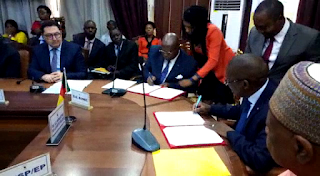Advocacy Immersion Meet-Up For ECCAS Think Tank Leaders Announced
By BEN
The meeting will happen at Djeuga Palace
Hotel on July 25 and 26, 2023, from 9:00 am to 5:00 pm daily. This session will
feature 25 leading think tanks selected within the region based on their
experience and expertise in their respective fields.
The
leadership and advocacy immersion program with support from the Open Society
Foundations (OSF) will take place at Djeuga Palace Hotel, from 9:00 am to 5:00
pm daily. This session will feature 25 leading think tanks selected within the
region based on their
experience and expertise in their respective fields.
The
objective is to strengthen the leadership and research capacity of these
leaders/researchers, particularly women (leadership and capacity development),
to conduct research and advocacy in the three main thematic areas: individual
rights, peace and security; governance and accountability; Regional
Integration.
Think
tanks, or independent policy research institutions, are critical in promoting
open governance, accountability, the rule of law, and respect for basic human
rights. George Soros, founder of OSF said: "According to the modern concept of
sovereignty, the natural resources of a country belong to the people of that
country. But governments which are supposed to be agents of the people put
their interests ahead of the interests of the people whom they are supposed to represent
and engage in all sorts of corrupt practices."
Dr
Denis Foretia, Co-Chair of the Denis & Lenora Foretia Foundation, totally
concurs with this assertion, arguing that: “Freedom House in their 2021 report show
that, of all countries in sub-Saharan Africa, only eight countries are ranked
as free and complete democracies. Dr Foretia added that “In the last 4 years,
we have seen a real acceleration of democratic backsliding.
Poor
governance and an unprecedented rise in authoritarianism also penalize the
ECCAS region. This is reflected in the blatant confiscation of political power
and flawed electoral processes that stifle civil liberties, exacerbate
corruption, mismanage state resources, and lack accountability. In addition,
the exclusion of women and minority groups from democratic processes or
inclusive governance has been one of the main sources of the various crises
affecting these countries.
Consequently,
regional integration has unfortunately remained very low. The ECCAS region
remains the least integrated region in Africa. This multi-factorial
under-performance needs to be appropriately addressed; otherwise, the benefits
of the AfCFTA agreement for the region will be reduced considerably. The low
level of economic integration within ECCAS countries is also a major impediment
to achieving the Sustainable Development Goals (SDGs).
Today,
hope lies in think tanks that are helping to promote inclusive and sustainable
conflict resolution, among others. That is why the trend needs to be reversed
to address all the challenges that limit these think tanks’ ability to
adequately defend policies that promote open, democratic and accountable
governance. This includes strengthening the leadership of these think tanks in
mobilizing movements and networks across Central Africa to promote thematic
concerns such as women’s rights, accountability, security and integrated
governance.
At
the end of the two-day immersion program, convened think tanks are expected to
strengthen their capacity to influence public policies and help political
leaders make informed decisions through pertinent recommendations. This
experience will enhance leadership skills, research and advocacy capacity,
while expanding visibility and reach across the continent and even worldwide.
In this regard, a cross-section of hand-picked experts have been invited to
share their experience with Central Africa think tank leaders on the thematic
concerns indicated above.
About
the Denis and Lenora Foretia Foundation
The
Denis & Lenora Foretia Foundation was established to catalyze Africa’s
economic transformation by focusing on social entrepreneurship, science and
technology, innovation, public health, and progressive policies that create
economic opportunities for all. The foundation works in partnership with local
governments, policymakers, private enterprises, civil society organizations as
well as development partners to expand the resources available to
entrepreneurs, farmers, and small business owners in addition to improving
individual livelihoods.
About Open
Society Foundation-Africa
OSF-Africa’s
vision is to build a globally respected, dynamic and integrated Africa
characterized by democratic governance, sustainable development and economic
systems that produce more just, inclusive and accountable outcomes with and for
Africa’s people and environment. In pursuit of this vision, OSF-Africa’s
mission is to advance gender justice and women’s rights, deepen democracy,
accountable governance and inclusive development in Africa through
participatory and strategic grant-making and advocacy.




Comments
Post a Comment